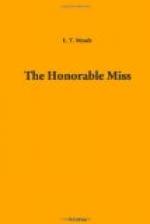Catherine and Mabel Bertram were in the highest possible spirits during this same month of August. Their mother seemed well once more, well, and gay, and happy. The hard rule of economy, always a depressing regime, had also for the time disappeared. The meals were almost plentiful, the girls had new dresses, and as they went out a little it was essential for them in their turn to entertain.
Mrs. Bertram went to some small expense to complete the tennis courts, and she even endured the sight of the Bells and Jenkinses as they struggled with the intricacies of the popular game.
She herself took refuge in Mr. Ingram’s society. He applauded her efforts at being sociable, and told her frankly that he was glad she was changing her mind with regard to the Northbury folk.
“Any society is better than none,” he said. “And they really are such good creatures. Not of course in the matter of finish and outward manner to compare with the people you are accustomed to, Mrs. Bertram, but—”
“Ah, I know,” interrupted Mrs. Bertram in a gay voice. “Rough diamonds you would call them. But you are mistaken, my dear friend; there is, I assure you, not a diamond in this motley herd, unless I except Miss Beatrice.”
“I never class Beatrice with the other Northbury people,” replied Mr. Ingram; “there is something about her which enables her to take a stand of her own. I think if she had been born in any rank, she would have kept her individuality. She is uncommon, so for that matter is Miss Catherine.”
The two girls were standing together as Mr. Ingram spoke. They were resting after a spirited game, and they made a pretty picture as they stood under the shelter of the old oak tree. Both were in white, and both wore large drooping hats. These hats cast picturesque shadows on their young faces.
Mrs. Bertram looked at them with a queer half-jealous pang. Beatrice was the child of a lowly tradesman, Catherine the daughter of a man of family and some pretension; and yet Mrs. Bertram had to own that in any society this tall, upright, frank, young Beatrice could hold her own, that even Catherine whose dark face was patrician, who bore the refinement of race in every point, could scarcely outshine this country girl.
“It is marvellous,” said Mrs. Bertram after a pause; “Beatrice is one of nature’s ladies. There are a few such, they come now and then, and no circumstances can spoil them. To think of that girl’s mother!”
“One of the dearest old ladies of my acquaintance,” replied Mr. Ingram. “Beatrice owes a great deal of her nobleness of heart and singleness of purpose to her mother. Mrs. Bertram, I have never heard that woman say an unkind word. I have heard calumny of her, but never from her. Then, of course, Meadowsweet was quite a gentleman.”
“My dear friend! A draper a gentleman?”




